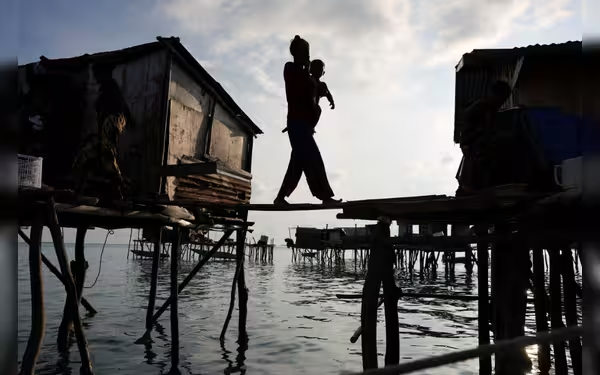Saturday, November 16, 2024 07:28 PM
Eviction of Bajau Laut Community in Malaysia Raises Ethical Concerns
- Bajau Laut face eviction from traditional homes.
- Lack of documentation limits access to services.
- Community advocates call for humane treatment.
 Image Credits: arabnewspk
Image Credits: arabnewspkThe eviction of the Bajau Laut community in Malaysia highlights ethical concerns and the need for humane treatment of marginalized groups.
In recent times, the plight of the Bajau Laut, a community of sea nomads in Malaysia, has come to the forefront, highlighting the struggles faced by marginalized groups in the country. These individuals, who have lived in the waters off Borneo for centuries, are now facing eviction from their homes due to government actions aimed at protecting marine parks and addressing national security concerns. The situation has raised questions about the treatment of undocumented communities and the need for a more compassionate approach from authorities.
The Bajau Laut are renowned for their remarkable ability to dive deep underwater without any equipment. However, despite their long-standing presence in the region, many members of this community lack the necessary documentation to prove their identity, age, or nationality. This lack of paperwork has led to their classification as migrants by the Malaysian government, which has resulted in limited access to essential services such as healthcare and education.
One individual, Robin, who was recently displaced, expressed his despair, stating, "I don’t know where to go now." He and his family are now living on a wooden houseboat after their home was demolished by officials. His cousin, Indasaini, echoed these sentiments, saying, "We can’t buy food because our gold pawn tickets were damaged during the demolition. We have no money. The children are sick and we don’t have money to buy medicine." This heartbreaking situation illustrates the dire consequences of the eviction for families who are already struggling to make ends meet.
Experts, such as anthropologist Vilashini Somiah, have called for a more humane approach from the Malaysian authorities. She emphasized the importance of consulting with the community before making decisions that affect their lives, stating, "These programs do not work because there’s no consultation with them in which you recognize the community as people." This highlights a critical gap in the government's approach to handling the needs and rights of the Bajau Laut.
The evictions are part of a broader crackdown on illegal settlements in protected areas, driven by concerns over cross-border crime and national security. The Sulu archipelago, located between Sabah and the southern Philippines, is known for its association with militant groups involved in piracy and kidnapping. While the government claims to be taking necessary actions to protect its citizens, the impact on the Bajau Laut community raises significant ethical questions.
Despite the challenges, there are voices within the community advocating for change. Bilkuin Jimi Salih, a young Bajau Laut, expressed the importance of obtaining Malaysian identity documents to secure better opportunities for education and employment. He lamented, "I had many ambitions ... to become a policeman, a soldier, but I can’t because I don’t have documents." His story reflects the aspirations of many young people in the community who feel trapped by their circumstances.
As the situation unfolds, it is crucial for the Malaysian government to engage with the Bajau Laut community in a meaningful way. The need for dialogue and understanding cannot be overstated. Without proper documentation, individuals like Bilkuin and Robin face an uphill battle for basic rights and opportunities. The call for citizenship and recognition is not just about legal status; it is about dignity and the chance for a better future.
The eviction of the Bajau Laut community serves as a stark reminder of the challenges faced by marginalized groups in Malaysia. It is essential for authorities to adopt a more compassionate and inclusive approach, recognizing the humanity of these individuals and their right to live with dignity. As discussions around citizenship and rights continue, it is hoped that the voices of the Bajau Laut will be heard, leading to a more equitable society for all.













